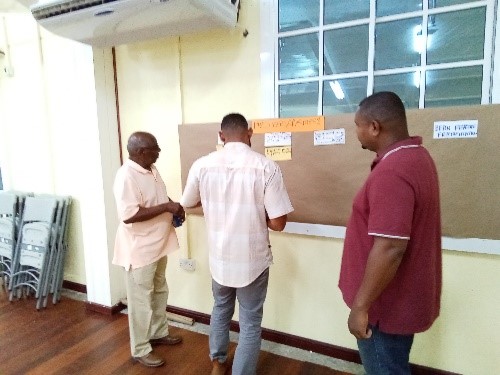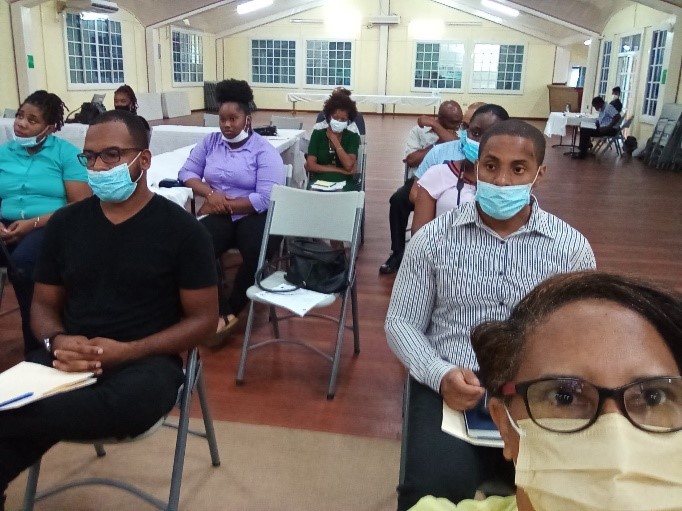Submitted by Dominica Bureau of Standards (DBOS)
Dominica’s cocoa bean and cocoa industry came in for some support recently, to better aid the competitiveness of this national exporting product.
The valued intervention came on July 27, 2021, when the Dominica Bureau of Standards and the Dominica Export Import Agency, in conjunction with the Technical Barriers to Trade (TBT) component of the 11th European Development Fund (EDF), Economic Partnership Agreement (EPA) Programme, hosted a value chain workshop.
The workshop brought together all the stakeholders in the growth, production and sale of cocoa in Dominica, as well as buyers to discuss the quality-related issues in the value chain and find possible solutions to those challenges.

Dominica is one of five countries in CARIFORUM, which will be hosting these quality fora with specific export-related value chains, with a view to boosting those exports by providing higher quality products for the respective markets. This thrust fits well within the overall aim of the TBT component of the 11th EDF, which is to close quality-related gaps in key value chains, sectors and organisations.
As the main quality infrastructure agency in country, the Dominica Bureau of Standards led the charge nationally for the quality support mechanisms and systems for the industry, alongside and working in concert with the Dominica Export Import Agency through its Cocoa Cluster Development Project.
Director of the DBOS, Mr. Median LaRocque acknowledged the role of the EDF programme in facilitating the development of national quality institution like the bureau, as well as the private sector, with an aim to reduce barriers to trade, while improving intra- and extra-regional trade.
“It is also expected that the region’s access to international markets is increased, thereby increasing our international competitiveness and the sustainable production of goods and services within CARIFORUM states.
“As the national quality institution for Dominica, the Bureau of Standards has as its core mandate the following: the development and maintenance of standards for the improvement of good and services used and produced in Dominica; improving industrial efficiency, promoting public and industrial welfare, health and safety and for safeguarding the integrity of the Environment in relations to processes and practices,” he said.
Mr. LaRocque added, “For us here in Dominica, cocoa, as an important export crop, is one which is steeped in Dominican history. From as early as the 1930s, Dominica has been exporting large volumes of “fine” or “flavour” cocoa to global markets. These large volumes of export were facilitated through production on seven of the large estates which operated on the island. Over the years, production and exports of cocoa have declined. There has, however, been a conscious effort to revitalize the sector and government has initiated a number of projects and activities as indicated by previous speakers.
“For this reason, the Bureau felt that it is important to assist with this process through the TBT Component of the 11th EDF EPA Programme. Under this programme, Dominica was selected as one of five (5) countries in CARIFORUM, to conduct value-chain analysis with specific export-related products, with the hope of boosting those exports by providing higher quality products for the respective markets. This analysis will be conducted using the CALIDENA Methodology. CALIDENA is a process of identifying and promoting practical activities to strengthen quality infrastructure for value chains and addresses potentials and weaknesses of quality-related services for a value chain.”

The two-day workshop, entitled, “Quality Relevant Opportunities and Problems in the Cocoa Sector for National and Tourism Use and Regional Export – From Cocoa Bean to Tea Value Chain in the Commonwealth of Dominica and Options for QI Response”, was held at the Goodwill Parish Hall. It was coordinated and facilitated by local consultant, Dr. Ian Lambert.
The aim at the end was to create an Action Plan for the cocoa industry, including interventions from the national quality infrastructure to further address the issues identified in discussions with sector stakeholders to enable the provision of technical assistance required to improve the quality and competitiveness of the cocoa stick/balls produced locally.




